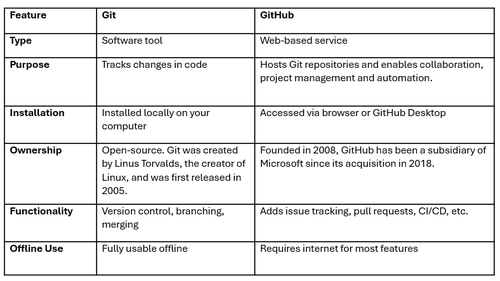What is Git?
Git is a locally installed software tool that supports developers to track changes to code. It is a version control system that allows the management of development for both individual developers and teams. No more copying your source files and maintaining manual backups! With Git developers can:
- Add files to a project called a “repository”
- Maintain a log of changes to files in snapshots called “commits”
- Build software in “branches” of commits, the tip of the branch recording the current state of the files in the repository for the selected branch
- Rewind the state of files to earlier commits on any branch
- Manage multiple branches simultaneously
- Merge branches easily, automatically resolving any conflicts between code changes on them
- Tag commits to label them allowing easy reference to snapshots of your code for publication or deployment
What is GitHub?
GitHub is a code management, collaboration and automation platform offered as a web-based hosting service. It incorporates all the core features of Git via the web browser while enabling developers to host repositories on GitHub servers that can be shared publicly or privately. This facilitates collaboration and efficient code management among software engineers wherever they are in the world. Key additional features include:
- Pull Request Reviews: When merging branches, GitHub can provide an environment for other people to review your changes and comment as appropriate, enabling peer review and safe merging of changes.
- Issues & Project Management: Track bugs, tasks, and enhancements, use project boards and labels to organise work.
- GitHub Actions (CI/CD): Automate workflows like testing, building, and deploying code. Supports custom scripts and reusable actions.
- Security & Compliance: Protected branches and tracking vulnerabilities in dependencies.
- Discussions & Wikis: Spaces for community Q&A and collaborative documentation.
- Codespaces: Cloud-based development environments that run in the browser.
GitHub Copilot explained
GitHub Co-Pilot is an AI-driven tool that can help write code by monitoring what is being written and drawing on source code from across GitHub to predict what to type next. You can also hold conversations with Co-Pilot via the chat interface. It can be used directly from within Integrated Development Environments (IDE) such as Visual Studio, Eclipse, PyCharm and Visual Studio Code to provide real-time suggestions. Users can also ask GitHub Co-Pilot to write code based on a direct prompt e.g. “Write a unit test for this function”.
GitHub Copilot offers five pricing tiers, University of Manchester staff and students can access the second tier—GitHub Copilot Pro—at no cost through the GitHub Education program. This article provides a breakdown of the features included in each Tier.
Note: It is essential to verify AI outputs for accuracy, stability, and efficiency.
Git vs GitHub: Key Differences
Git and GitHub work together. Developers push code from Git to a “remote repository” that lives on GitHub servers to make it visible to others. Collaborators can view, comment and contribute via pull requests through the GitHub interface and any changes are “pulled” back into the developer’s local git repository – essentially keeping it in sync.

Steps to get access to GitHub Pro tools
Although use of GitHub is free, University staff and students can access Pro features of GitHub, and GitHub Copilot Pro for free through the University’s participation in the GitHub Campus and Education programs.
- Register a GitHub account if you don’t already have one
- Go to the GitHub Education page and click “Join GitHub Education”
- Select “Start an application for GitHub Education”
- Indicate whether you are a staff member or student, and choose the University of Manchester as your institution
- Use your @manchester.ac.uk email address as your school email
- Click on “Share location”
- When prompted, upload a photo of your University staff or student ID
- Submit your application. It will be marked as pending while it is verified—this may take a few days.
- Once approved, visit your GitHub Education portal to access GitHub Education benefits including the Education pack
GitHub Enterprise Access
Through the University’s membership of the campus programme, we have a GitHub Enterprise account which allows:
- Creation of new GitHub organizations within the University’s GitHub Enterprise.
- Integration of existing organizations into the Enterprise.
Membership allows access to a free pool of GitHub Actions’ minutes for your organization. To request access or obtain support on GitHub organizations, contact the University’s GitHub Enterprise administrators in Research IT by raising a request via Connect.
In-house training and support for using Git tools
- Git training is available via a free course provided by Research IT.
- The Research Software Engineering team provides general support and assistance on all GitHub tools, please raise your enquiry using Connect.
- Our regular online Research IT drop-in sessions are a great channel for obtaining expert advice from experienced developers on all things research computing. Check our events page for details of the next session.
Ready to Get Started?
Whether you're building your first script or collaborating on a global research project, GitHub tools will help you code smarter, faster, and more securely. Remember if you have any questions after reading this guide, get in touch with our RSE team for more advice and guidance.
Don’t miss out—take advantage of the University’s free access today.

